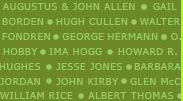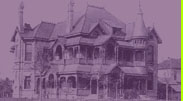TIMELINE 1840 - 1850
1840
Houston's charter was altered and the town divided into four wards, with each ward electing two representatives to the municipal government. The First Ward was everything to the north of Congress and west of Main. The Second Ward was everything north of Congress and east of Main. The Third Ward was everything south of Congress and east of Main. The Fourth Ward was south of Congress and west of Main. The Fifth Ward and Sixth Ward were added later as development spread north of Buffalo Bayou. These wards ceased to exist as political subdivisions many years ago, but the terms sometimes are still used
The first local dock was constructed as the Texas Congress authorized the city to build and maintain wharves
Construction was begun of the first local church, and interdenominational structure
The city council passed one ordinance prohibiting the carrying of deadly weapons, and another, imposing fines and jail sentences for "lewd" activity by females
January 6
Charles Bigelow was elected Houston' fourth mayor
January 18
Five prisoners escaped from the Harris County jail in Houston' s first major jailbreak
January 28
A group of Houston merchants was granted a Republic of Texas charter to found a chamber of commerce, and so Houston's first Chamber of Commerce was established
April 4
The Chamber of Commerce was organized at a meeting at John Carlos' City Exchange. Its main early accomplishment lay in setting standard rates for freight handling and storage
November 22
Seventy-five resident German families founded the Deutscher Verein fur Texas to aid newcomers
1841
The Houston House opened as the town's first luxury hotel
Two sawmills and a brick factory, were among Houston's first industries, and were located on the outskirts of town
A grand jury reported that vice had diminished and dueling was considered "ungentlemanly"
Construction was begun on the first Presbyterian church
The Houston-Austin stage line began operations over a run where twenty days was considered good time for freight wagons, and freight rates were $30 per hundredweight
January 16
Col. J. D. Andrews was elected mayor
April 10
The First Baptist Church of Houston was organized
June 10
A city council ordinance established the Port of Houston, giving it control over all wharves, landings, slips, and roads on the banks of the Buffalo and White Oak Bayous, as well as the right to collect wharfage fees and invest the funds in Bayou improvements
November 6
Houstonians turned out for a day-long celebration when General Sam Houston returned for a visit
Sam Houston elected president for second term
1842
Sam Houston temporarily returns the seat of government to the city of Houston
The city extended from the bayou on the north to Walker Street on the south, from Bagby Street on the west to Caroline Street on the east
A wave of temperance swept Houston bring almost nightly meetings
Houston's first parochial school was established by the Catholic church
Rev. H. Reid opened the Select Classical School which charged $5.00 a month
The city's fathers build the first City Hall
January 29
The Texas legislature passed a bill permitting the city to clear vessels sunk in Buffalo Bayou and obstructing navigation. Further, Houston was authorized to collect wharfage fees with which to improve navigation above Harrisburg
April
Sam Houston stopped from moving the state archives from Austin to Houston
April 11
Galveston News begins publication
Summer
The first Catholic church was constructed, the Church of St. Vincent de Paul
After a Mexican army invades Texas, Congress, by order of President Houston, meets in special session at Houston, using the Presbyterian Church building
June 27
The Texas Congress temporarily returned to Houston with Austin threatened by Mexican attack
September 29
The Capital is removed to Washington on the Brazos
1843
Francis Moore, Jr. again became mayor
The first bridge was built over Buffalo Bayou
June 30
Second Sante Fe expedition captured by U.S. Army
September 1
With prostitution an early problem, an ordinance was passed, prohibiting "lewd" women within city limits
1844
Sam Houston's 2nd term as president of Texas ends
Horace Baldwin became Houston's Mayor
The first cotton compress was established
The first saw mill was established on Buffalo Bayou at Milam Street
A cornmeal mill on the bayou at Texas Avenue was using three oxen on a treadmill for power
A decade of heavy German immigration to Texas began, and many of the new arrivals remained in Houston
The Davis Compress, the city's first cotton compress, began operating
Eighty steamboats and sloops docked at Houston, taking on 6,893 bales of cotton and 6, 486 hides, among other items
May 12
The Methodist church, said to be the first brick building in Texas, was opened
United States of America offers statehood to the Republic of Texas
1845
March 1
Texas was annexed to the United States and becomes the 28th state of the Union
W. W. Swain was elected mayor
Houston's Port handled 11,359 bales of cotton
Mexico severs relations with the United States of America
1846
James Bailey was elected mayor
Four regiments of volunteers from Harris, Galveston, and Jefferson Counties join the United States forces in the Mexican War
Water transportation was interrupted as the federal government chartered steamboats for the Mexican War
January 9
Houston hosted a pioneer convention of primary school teachers
February 19
Republic of Texas flag lowered and U.S. flag raised at Austin
May 13
The United States declared war on Mexico
1847
B.P. Buckner was elected mayor of Houston
March 2
Signing of treaty between German settlers and Comanches
December
A local census set the city's population at 4,737, with 607 qualified voters and 622 slaves
1848
Mexico yields all its claims to the territory to Texas, part of nearly one million square miles of land it ceded to the United States of America
The Houston Lyceum was granted a charter and opened a 382-volume library, but the movement did not really succeed until late in the century
Galveston Country Club opens, with the first golf course in Texas
Sept-October
Houston has Yellow Fever epidemic which kills 105 people
1849
Francis Moore, Jr. once again became Houston's mayor
A number of Houstonian get "Gold Fever" and head for California to seek their fortunes
The Ogden arrived in Houston directly from New Orleans. It was the first Ocean-going steam packet to do so, but the shallow Bayou prevented inauguration of regular service
1850
The United States takes its 1st census covering Texas
William Marsh Rice married railroad promoter Paul Bremond's daughter Margaret
The U.S. Census reported Houston's population at 2,397, only 322 more than in 1839.
Harris County Population: 4,686
Galveston is ranked as the largest and wealthiest city in Texas with the largest port
February 11
A charter was granted for the Buffalo Bayou, Brazos and Colorado, a railroad centered on the town of Harrisburg
May
Local businessmen organized the Houston Plank Road Company which built a toll road to the Brazos River






